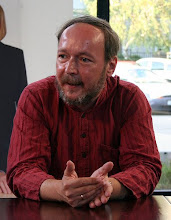
This consultation was attended by about 50 participants, coming from civil society and the academia. Learning from our experiences in Bangalore we slightly modified our presentation. Amita started with placing the National Trust Act and its provision on limited guardianship into the historical context. I gave concrete examples for support networks and spoke about the Swedish personal ombudsperson programme and the work by the Canadian Association for Community Living. 

Several unexpected barriers disabled the success of the meeting. Lawyers from the Law School's disability law unit prepared a textual recommendation on how to amend the National Trust Act to become compatible with the Convention on the Rights of Persons with Disabilities. We, as resource persons were unaware of this work. Further complicating the situation the textual proposal conceptually differed from our consultation paper which had been sent to all the participants well in advance in the sense that their proposal allows for guardianship in cases of acute conditions of disability when the person is unable to form an opinion and communicate that.
The other barrier was that most participants were unprepared for the consultation. We understand that the new paradigm of recognition of full legal capacity in conjunction with the right to support in decision making takes time to understand, however if people come to consultations without making the effort to even read the consultation paper, no substantive discussion can be expected.
Amita and I decided to rewrite the consultation paper with including a more in-depth historical context and concrete examples for support networks. We also need to think about how to organise effective consultations.
The most troubling aspect of this consultation was the effectiveness of consultations. CRPD is explicit about the states' duty to consult and involve persons with disabiltiies through their organisations in every decisions affecting their lives. The question is what will guarantee that those consultations will contribute to the affairs in a substantive manner. In our case we had the most supportive chair of the National Trsut, who has full understanding of the rights based approach to disability in general, and legal capacity in particular. We had organisers of high academic and civil competence. And the outcome is still very poor.
We are convinced that a meaningful participation of persons with disabilities who advocate for themselves is a sine qua non condition for successful consultations. At the Bangalore meeting we had a dozen well empowered, skilled self-advocates. In Guwahati no one with an intellectual disability was present.

No comments:
Post a Comment